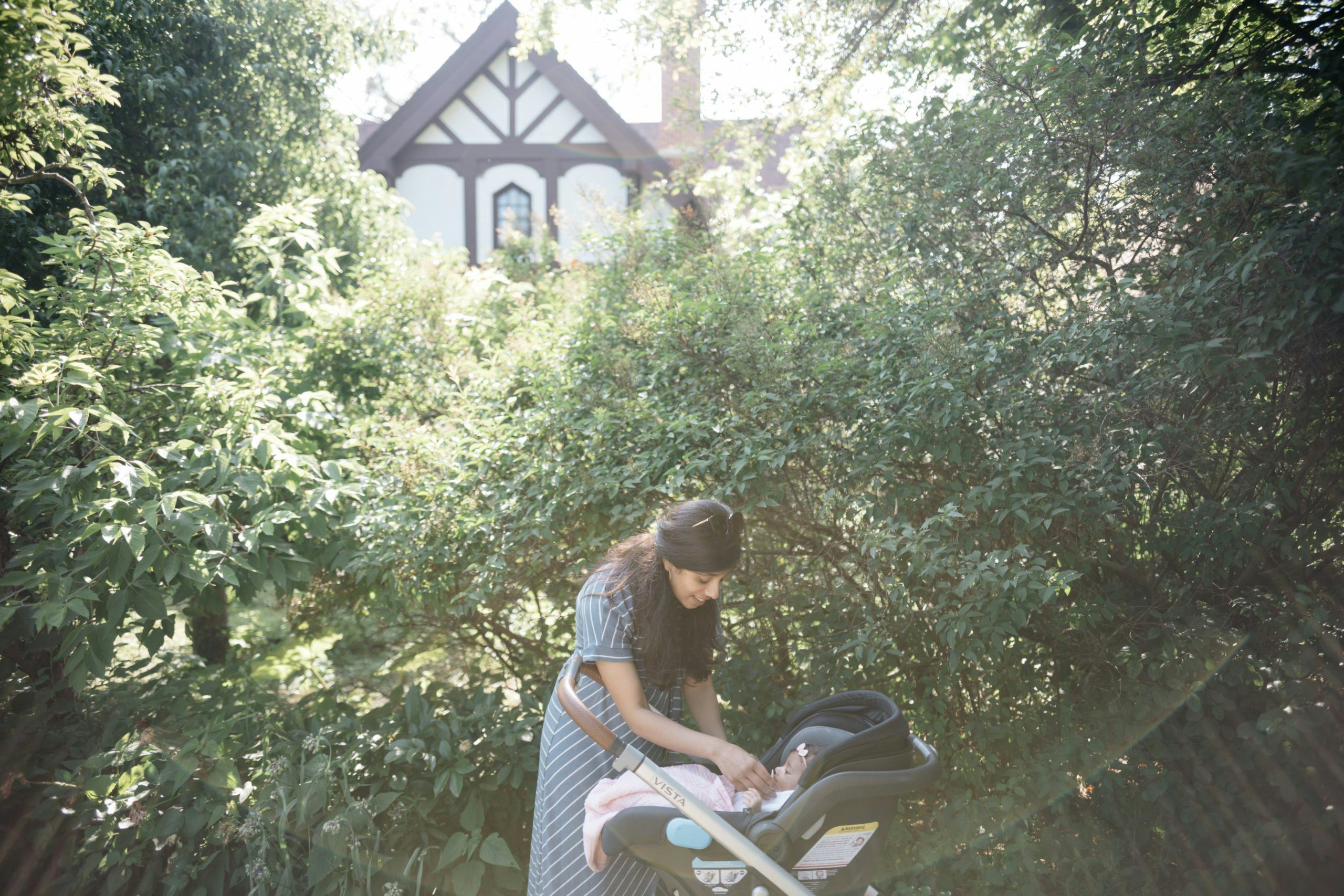Pregnancy should not have taken me by surprise. As the daughter of a nurse, and the granddaughter of three doctors – one of whom set up a reproductive health clinic in the 1960s – I was well versed on everything from anatomy to childbirth. But although I understood the biology of having a child, my surprise at becoming a mother lingered throughout my pregnancy.
As three positive pregnancy tests sat on the bathroom sink, I could hardly breathe. I phoned my oldest friend.
I don’t know what to do?
What do you mean? You don’t need to do anything, just eat lots of vegetables and stay hydrated. Tell your doctor, find a midwife. Congratulations!
Sound advice from my wise and pragmatic friend, a nurse, and a mother.
But despite the fact that women have been having babies since life began, I couldn’t fathom that I myself was having one, too. From what I had gathered, women seemed to “just know” how to be mothers. I didn’t feel that I was one of those women.
I have always loved babies and so have inevitably spent large quantities of time with mothers. Despite the fact I was paying much more attention to their offspring, I had gathered from these women that motherhood was the ultimate joy in life. I considered my own melancholic tendencies and decided that I would look forward to this joy that came from having children, that made life more meaningful and exciting.
I began to feel relatively optimistic about the outcome of my pregnancy, from what I had perceived it seemed that I would eventually ‘just know what to do’. For the time being, I was overwhelmed by the enormity of the responsibility I had been tasked with. Growing the baby in utero felt like the most important thing I could and would ever do. I followed every rule to the letter, in fear I might lose the baby. I didn’t eat soft cheese, or sushi, or too much sugar, or unwashed salad greens. I resisted the cured meats at Christmas. I exercised, but not too much. I ate plenty of vegetables, took vitamins, and went to antenatal classes.
I did everything right. He was small anyway.
My clever, loud, delight of a child entered the world three weeks before we were ready. He was, for reasons unknown, very small for his gestation. My pregnancy was textbook perfect; the scans were all normal. And so it was a shock to hear those first words out of my midwife’s mouth. Oh, he’s very small…
At public hospitals, fathers are not allowed to stay overnight. New Zealand has excruciatingly high rates of domestic violence, and although I understood and supported the reasons for this hospital rule, I felt panicked when I was left alone with our baby each night in hospital.
It wasn’t just the physical support – here is the burp cloth, the nappy, the suction cups for the electric pump. It was having someone to affirm me, to tell me I was doing ok, I would get it right. Every new midwife, in that overloaded, underfunded hospital asked me the same questions: Have you taken drugs? Did you smoke during your pregnancy? Do you have an eating disorder? Why? Why? Why is your baby so small?
To plump up our baby, we embarked upon a strict regimen, feeding him every three hours. Six weeks of feeding, pumping, tube feeding, burping, sterilizing, and then panicking when he inevitably vomited most of it up. We had ninety minutes to sleep, eat, see friends, or cry before we started again. I scheduled visitors around pumping, I couldn’t bear to look anyone in the face whilst my nipples were being rhythmically yanked into plastic suction cups. I was too tired, too angry, too forgetful to hold a conversation. I had not realized that bringing another person into the world would be so incredibly lonely.
I felt myself descend into panic. I didn’t know how to do this. It wasn’t coming naturally.
What if I wasn’t a good mother? What if I wasn’t supposed to be one?
We lived hours away from family, and although they visited as often as they could, I desperately needed regular time with people who knew me. I needed a village.
I needed my mum who had had three children and worked in an emotionally demanding job in palliative care.
I needed my husband’s mum, my gran, my friends’ mums, my nieces’ mum.
I needed the mother who sold me hot chocolate on my first excursion out of the house and told me her partner gave birth to their child 6 months ago and parenting was the hardest thing they had ever done.
I needed all the mums. All the women who knew what it was to be a mother, and who would be living proof that I could do it, I could raise this child and come out the other side of it where we would both be able to laugh and smile and be happy.
I desperately needed my friends who did not have children. My friends who could talk to me about anything else. About church, about feelings, about marriage, and work, the news, anything.
I needed my colleagues who could talk to me about school, pedagogy, Mikhail Bakhtin, playground duty. I needed old school friends who would talk to me about the fact that our old crushes were now balding, and the time we brazenly stuffed our bikinis tops with jellyfish.
I needed an anchor to the world I was a part of before I became a mother, some string to help me navigate back through the maze and find the bits of myself that were still alive.
Early on, a friend from church set up a dinner roster. For two weeks, our bodies were nourished by friends who loved us generously, with home cooked meals, treats, hugs, magazines, offers to fold washing and vacuum. It was cheering to see dear friends each night, I desperately craved time with them. But more than that I craved just being a person who was actually capable of spending time with others. All I could think about was sleep. We had nothing to offer, not even coherent conversation. The selflessly kind attention of these friends was an overwhelming relief from the isolation I found myself becoming enveloped by.
Don’t you just love being a mother?
Isn’t it the best?
You’re so tired but you don’t even mind, do you?
I did mind. I had never minded something so much in my life.
Well-meaning people asked me these questions, mostly at church, but also in cafes and in the supermarket, even on public transport. At first, I answered them honestly. No. I’m so tired. I don’t know what I’m doing, but this provoked alarm which I found too emotionally exhausting to deal with, and so smiling vaguely was much easier.
On a particularly challenging morning at church a woman said to me: oh it’s not that hard! And yet, it was hard, for me.
I was lonely already, but these interactions felt like a personal attack. They were proof of my failure as a mother. I felt that I could no longer be vulnerable with others about what I was experiencing. It appeared to me that motherhood was a bizarre and exclusive club – one that I had ended up in without knowing the rules or the secret handshakes. I was stuck there. Where was the joy?
My sweet baby wanted to be held constantly. For a month, he would not sleep longer than forty minutes at a time. The days passed slowly. My husband and friends at work, I was too tired to meet them for lunch. I dreaded the nights, my incompetence roared in the screams of my baby who would not sleep.
In the middle of the night, mum groups on Facebook became a lifeline. At 1:00 am, and 2:00 am, at 2:30 am, 3:15 am, at 4:06 am, I was there. Cuddling, rocking, shushing, patting, crying. I found other mothers who I had never met, but who were all asking the same questions. Why won’t my baby sleep? What am I doing wrong? What is wrong with my baby? My baby is broken, what do I do? Can I die from this?
These women gave me a glimmer of hope. Perhaps not all mothers loved every minute. Perhaps not all mothers could get their baby to sleep.
*
Upon realizing we were pregnant, we had signed up for antenatal classes with eight other couples. For the most part, we were all complete strangers who only had pregnancy in common. I was absolutely sure we would not be friends. As a coping strategy for my obvious discomfort, I giggled my way through every antenatal class and then sobbed in the car on the way home. I was the youngest in our group, and I felt it keenly. No one else seemed completely terrified by any of this; they all seemed ready to be parents.
Emma, a cheerful, funny, organized member of the class gathered our contact details and made a Facebook group as a means to reconnect after the babies were born. April arrived, and one by one, each of us shared a pink fleshy photo with the group: the babies were here! Some came quickly, some agonizingly slow, some early, some late, some bald, some chunky.
Tentatively, someone suggested we meet up.
It was a lovely sort of chaos meeting in a cafe or someone’s home, and an immense relief to be with others who were living through what I was. The myth of the perfect joyful baby dissolved before me. Some babies had allergies, some were itchy, some wouldn’t eat, or sleep, or be quiet. My own baby seemed manageable in that mass of squirming arms and legs.
We allowed ourselves to be vulnerable in front of each other, to find motherhood difficult, to cry. Clare’s baby didn’t sleep either, and we bonded over the lengths we would go to get sleep, and the things we had done due to lack of it.
Realizing that I did not drive, Col offered to pick me up each week. This action was perhaps singlehandedly responsible for my happiness that year. Tired eyes on the road, burbling babies in the back we talked freely about everything and nothing. I confessed things to Col. I forgot my baby’s name at the hospital…I yelled again… I forgot to buckle him into the buggy and he wriggled onto the floor like a little slug. She would laugh, or say, Me too! or Are you ok? She shared her own sins of motherhood freely and we laughed with each other at the disproportionately enormous burden of guilt for such small things.
The coffee group began as a cure for the mundanity of motherhood. A brief reprieve from the relentlessness of changing nappies, cleaning, feeding, waking. Again, again, again. During that first year, I often thought of the Bell Jar. Esther Greenwood despaired at the never-ending job of washing one’s hair, concluding that she would do it just one final time and never again. Looking after a newborn felt that way to me. It didn’t matter how well I changed him or fed him, I’d have to do it again very shortly. I could not keep sight of the greater goal. I did not notice him flourishing before my very eyes.
But when I spent time with these women – Clare, Emma, Col, Mere, Jordan, Emily, Katie – they made me laugh with my whole body. They were clever, funny, and kind. They marveled at my baby, and I marveled at theirs. The truth was: we knew very little of each other, other than the babies we had each produced. We kept each other afloat with observational praise.
You’re doing a good job. You’re doing a great job. Look at you! Look at your baby! Look how deliciously fat he is getting! Her thighs are like croissants! Wow his skin is so clear now! Amazing, look at her laughing! You’re such a good mum.
This group of women were the best mothers. They loved their children fiercely, they made sacrifices, they made decisions, and they had lives and stories outside of their babies. They were generous, insightful, witty. I found so much joy in their company. I allowed myself to hope in these women.
Our baby was hospitalized several times in his first six months. He was still little and susceptible to viruses. Daily, I languished in guilt. I wrung myself out and drenched myself again. I found innumerable things I was doing wrong and thought, how was I allowed to be a mother?
I could not do this with my coffee group. It wasn’t so much that they negated my every attempt to panic about my parenting, it was that together we laughed about it. The others had hospital visits, too, for much more serious challenges. We bonded over attempts to catch urine samples, exchanged stories about hospital staff, sent funny videos, and political articles, arranged meals. We focused on the things we could control whilst supporting each other through the things that felt impossible.
We became our own village.
The community that I found in this group of women surpassed anything I had imagined. We built connections as we each forged our way into this new all-encompassing phase of life. Our world views, personalities, and approaches to parenting differed in the extreme but this only seemed to work in our favor. Never did I sense even a hint of judgment or competition from these women. We were bound together by the shared recognition that we were all doing our best, whatever that might look like.
Five years on, our babies are nearly at school. Since the first meeting, our group has suffered losses together, reveled in each other’s successes, shared worries and what ifs. We don’t see each other so regularly as our paths have diverged even further, but the village we have built remains.
“Friendship … is born at the moment when one [person] says to another
‘What! You too? I thought that no one but myself.’” – C.S. Lewis
Libya first encountered God as a teenager at a Baptist church at 15 years old. She now identifies as a non-denominational Christian. Libya enjoys robust discussion about faith, as well as reading novels, and rooibus tea.
Discover more from Libya Kate.









